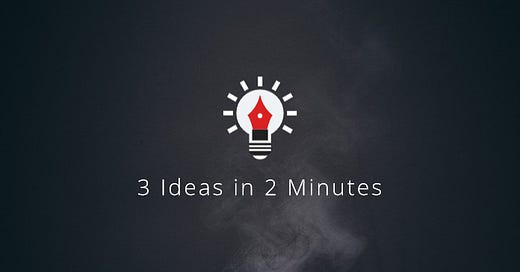#162: Dragon King Theory, Causal Reductionism & Alternative Future Analysis
3 Ideas in 2 Minutes on Unexpected Events
I. Dragon King Theory
Dragon King Theory is a concept that states: In any complex system, incredibly big and unusual things can happen unexpectedly. Such an event is not only exceptionally powerful but also highly significant. It’s large in size or effect, as is a king. And unique in terms of its origin, as is a dragon.
Rain, sunshine, a fresh breeze, more sunshine, a cold front and some more rain are everyday weather events. At least when you’re living in Melbourne, Australia. A catastrophic thunderstorm or earthquake and a major flood, on the other hand, would be untypical yet impactful events; a deviation from the norm.
The best way to deal with such events is to build resilience, or better yet: antifragility. This is why Dragon King Theory is often compared to Black Swans, highly improbable, high-impact events that only seem inescapable in hindsight.
II. Causal Reductionism
We’re not great at anticipating events. Once they’ve occurred, we’re also not great at saying why they happened. We engage in Causal Reductionism, also known as the Fallacy of the Single Cause. As the name suggests, we wrongly assume there’s a single cause for an event. In reality, there are many interrelated causes and reasons that lead to a certain outcome.
Why is the weather in Melbourne so unpredictable? You could reduce your answer to the city’s proximity to Antarctica. Or you take other factors into account. The desert winds coming from the north, for example. Or Melbourne being close to the ocean. All contributing to Melbourne’s four-seasons-in-one-day trope.
III. Alternative Future Analysis
Alternative Future Analysis is a Structured Analytic Technique commonly found in intelligence analysis. The method is used to explore ways in which a complex and uncertain situation could develop.
Alternative futures analysis (often referred to as “scenarios”) is most useful when a situation is viewed as too complex or the outcomes as too uncertain to trust a single outcome assessment. First, analysts must recognize that there is high uncertainty surrounding the topic in question. Second, they, and often their customers, recognize that they need to consider a wide range of factors that might bear on the question. And third, they are prepared to explore a range of outcomes and are not wedded to any preconceived result.
If you’re keen on a practical example, check out my long-form article on Structured Analytic Techniques applied to modern movie classics. 🐘
Have a great week,
Chris
themindcollection.com



